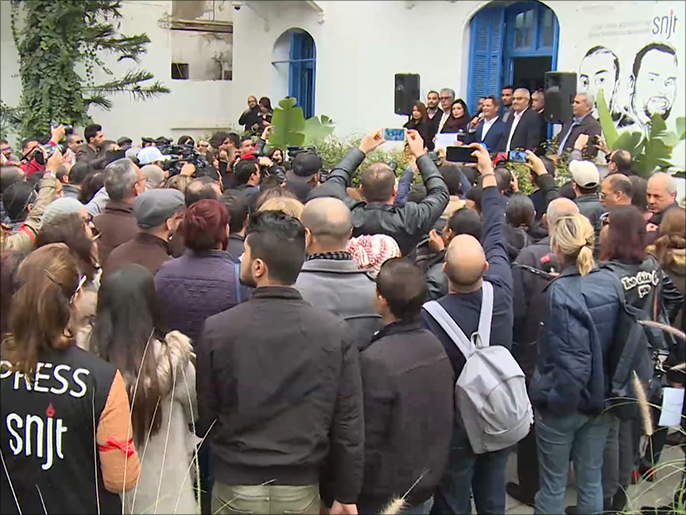The Syndicate of Tunisian Journalists approved a general strike in public media institutions on the first of next April, in rejection of what it described as President Kais Saied's attempts to control the public media, the authority's insistence on marginalizing the sector, and against the backdrop of protests by workers in these institutions against their professional conditions.
The escalation comes as criticism from the syndicate and journalists is mounting that the official television has become a propaganda for President Qais Saeed, and after the imprisonment of a journalist who refused to reveal his source in news about the dismantling of a terrorist cell.
The head of the Tunisian Journalists Syndicate, Mohamed Yassin Jelassi, said that all that the authority is promoting about guaranteeing freedom of the press, "they have no basis on the ground."
In Al-Jelassi’s estimation, the arrest of journalists is “one of the most serious cases that have occurred since the 2011 revolution, especially since July 25,” when President Saeed announced exceptional measures through which he froze the powers of Parliament, lifted the immunity of his deputies, dismissed the prime minister, and suspended sections of the constitution. and formed a new government, which plunged the country into a political crisis ever since.
The Syndicate of Tunisian Journalists pointed out that the authorities "apply force and exploit state agencies...a clear policy in order to silence, intimidate and intimidate journalists."
Part of previous protests by journalists in Tunisia in 2018 (Al-Jazeera)
Journalist arrest crisis
On Wednesday, the Tunisian Journalists Syndicate accused the authorities of employing state agencies to "silence" journalists, following the arrest of a local radio reporter who refused to reveal his sources.
Journalist Khalifa Al Qasimi works as a reporter for the private radio "Mosaic FM", and was arrested on Friday in accordance with the anti-terror law after he published a story on the radio's website regarding the dismantling of a "terrorist cell" and the arrest of its members.
The judiciary called on two other journalists - one of whom is the editor-in-chief Al-Hussein al-Dababi - to appear Friday before the investigative judge at the Judicial Anti-Terrorism Pole on the same issue.
In a statement on Tuesday, the International Federation of Journalists demanded "Khalifa Al Qasimi's immediate release."
"President Saeed must defend the freedom of the press and ensure the security of our colleagues in the performance of their duties," said AFP Secretary-General Anthony Bellanger. "We cannot tolerate the continued targeting of journalists."
On Wednesday, human rights organizations in Tunisia warned of what they described as a decline in the level of freedoms and an increase in the pace of restrictions on freedom of expression, calling on the authorities to stop the nature of discrimination in the practice of law.
This came in a press conference organized by the "Civil Coalition for Individual Freedoms" (a non-governmental organization that includes about 40 human rights associations and organizations) in the capital, Tunis, to present reports on the human rights situation in the country, and it will be presented to the Human Rights Council currently in Geneva.
The report prepared by the coalition - according to the Anatolia correspondent - includes 88 recommendations that will be presented to the Human Rights Council in Geneva at its 49th session, which began on Monday and will continue until the first of next April.

